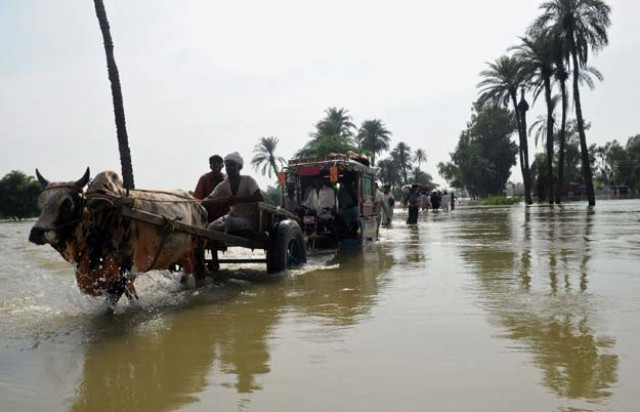Floods could affect nearly 2.7m people in Pakistan by 2030: Study
Globally, nearly 54m people could be affected by floods every year with India, Bangladesh, China most at risk

Estimated 715,000 people in Pakistan are every year affected by the floods. PHOTO: AFP
According to the report, prepared by the US-based World Resources Institute think-tank and four Dutch research groups, it estimated that people being affected by the river-floods could reach up to 2.7 million people by 2013. Currently, an estimated 715,000 people in Pakistan are affected by the floods every year. Last year, nearly a million people were affected by the floods.

This map by NDMA shows the areas affected by floods in 2014.
In terms of Gross Domestic Product (GDP) being affected by the flooding, according to estimates annual loss to GDP due to river flooding amounts to 0.98 per cent of the country’s total GDP which translate into $1.7 billion.
Beside climate change, which is the major cause of flooding, socio-economic development in low lying regions is expected to add to the more losses as result of flooding, especially in developing world.
India, Bangladesh, China most at risk from river floods
According to the study, India, Bangladesh and China are most at risk from river floods, with an increasing number of people threatened because of climate change and economic growth in low-lying regions.
The report found that some 21 million people worldwide were affected by river flooding in a typical year.

"That number could increase to 54 million in 2030 due to climate change and socio-economic development," their report said.
People living in 15 emerging nations, led by India, Bangladesh, China, Vietnam and Pakistan, accounted for almost 80 per cent of all those affected by floods in an average year, it said. In India alone, almost five million people were at risk.
The United States had 167,000 people exposed to floods in an average year, the most for any developed nation, putting it on 18th from more than 160 nations ranked.
The UN panel of climate scientists said last year that global warming would lead to more risks of floods, heatwaves, storms, downpours, landslides, air pollution, water scarcity, sea level rise and storm surges.
Thursday's study estimated that $96 billion of annual global gross domestic product was exposed to river floods every year, led by India on $14 billion and Bangladesh on $5.4 billion. This amount could rise to $521 billion by 2030.
"There will be a huge increase in risk, especially in South East Asia," Hessel Winsemius, an author of the study at Dutch independent research institute Deltares, told Reuters.
Such flooding can also impact multinational companies which spread their production capacity -- monsoon floods in Thailand in 2011 killed more than 800 people and closed many factories -- including some making parts for firms such as Intel and Apple.
Many cities on flood plains were expected to expand in coming years, putting more people and businesses at risk. Multinational companies should think more about flood risks, including back-up suppliers or insurance from vulnerable areas.
Developing nations are working to adapt. Thailand, for instance, is experimenting with floating homes that can rise up above the waters on pontoons filled with styrofoam.



















COMMENTS
Comments are moderated and generally will be posted if they are on-topic and not abusive.
For more information, please see our Comments FAQ